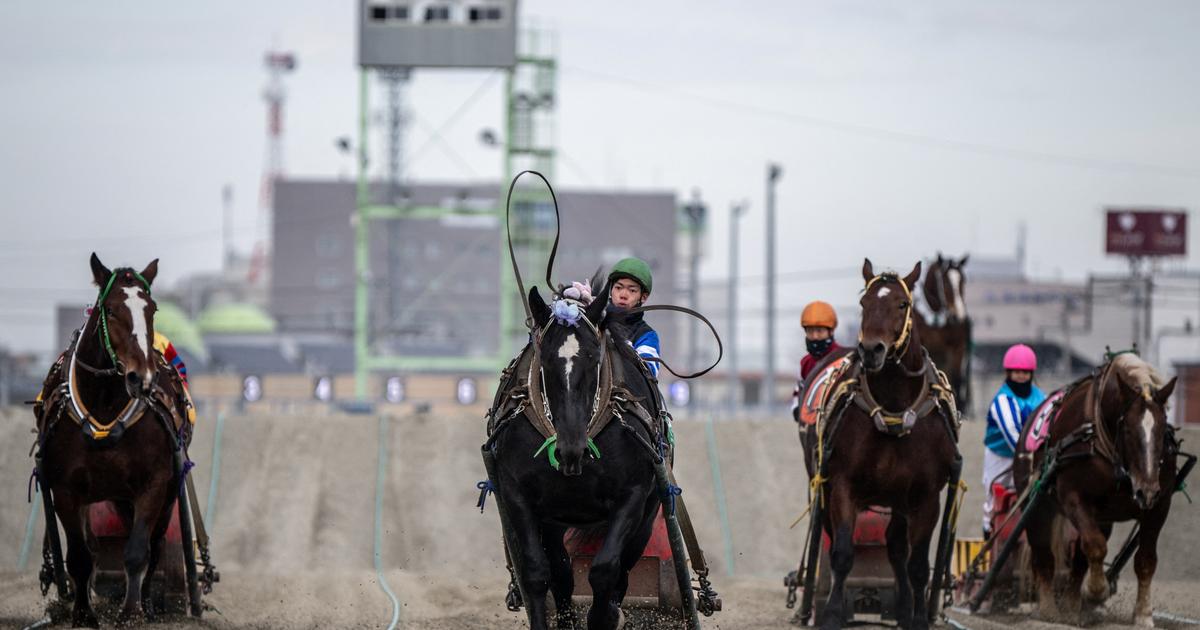On a cold winter afternoon, eight horses kick up clumps of dust as they progress up one of the two hillocks of the 200-meter sandy track, towing sleds weighing more than 600 kilos. .
But suddenly, the animals, which alternate between walking and trotting, stop: the first of several breaks they will make during the race to catch their breath.
To discover
Travel to Japan: tailor-made tours, hotels and stays from our partners
Called “banei keiba” (or “trait-tract”, in English), these power races take place all year round in Obihiro, a small town on the big island of Hokkaido in Japan, the last official place to perpetuate this sport whose origins date back to the end of the 19th century.
Also read: From one temple to another in Shikoku, on the path to the oldest pilgrimage in Japan
With another particularity: the interruptions of the tired horses “
give a little suspense
” to the races, which last barely two minutes for the fastest, comments Esther McCourt, a 24-year-old Australian tourist marveling at the size of these robust horses, twice as heavy as thoroughbreds.
It doesn't matter if the start was good or not, "
the crucial part is the last fifty meters, so it can change at any time
," she says.
From fields to racetracks
Standing on the sleds, the jockeys shout and whip their horses with long driving reins to encourage them to move forward.
But the banei keiba community rejects any accusation of animal cruelty, ensuring that these draft horses, called “banba”, are treated with care and do not pull loads beyond their capabilities.
“
If thoroughbreds are born to race, banba are made to tow
,” notes Yoshiyuki Hattori, a trainer whose horses have won numerous prizes.
Previously, the banba “
worked in the fields, they worked for us humans.
We want to perpetuate this history
,” he adds.
In the late 19th century, Japanese settlers in Hokkaido used these highly durable horses for agriculture, transporting goods, and mining.
They also had the habit of pitting them against each other in tests of strength during festivities.
These games gradually gave rise to the horse sport of haul-tract, which was formalized after the Second World War.
A return to favor linked to sports betting
Banei keiba has seen a resurgence of interest since the pandemic, during which more Japanese have indulged in online sports betting.
PHILIP FONG / AFP
These races, on which betting is authorized, were very popular a few decades ago.
But Japan's demographic aging and economic stagnation then took their toll, leading to their disappearance, except in Obihiro.
Banei keiba has even experienced an unexpected resurgence of interest since the Covid-19 pandemic, during which more Japanese have indulged in online sports betting.
Various means have also been put in place to broaden the audience of the flyer beyond punters, for example with the installation of an animal farm for children next to the Obihiro racecourse.
Read alsoVisit Japan in 13 days: recommended itinerary day by day and practical advice
“
Many people don't know that horses are not only used to gallop and carry riders on their backs
,” explains Yuno Goto, a 21-year-old trainer who dreams of becoming a jockey.
The banei keiba allows us to show the general public the ancient culture of draft horses, and to provide “
a different experience compared to other horse races
”, she believes.
Taichi Yamada, a 27-year-old spectator of the race, also hopes that this sport will continue, to keep the tradition alive.
“
It must be hard for the horses to pull such loads.
So we can’t help but shout to encourage them
,” he appreciates.
In video -
Japan welcomes a record number of travelers in December 2023

